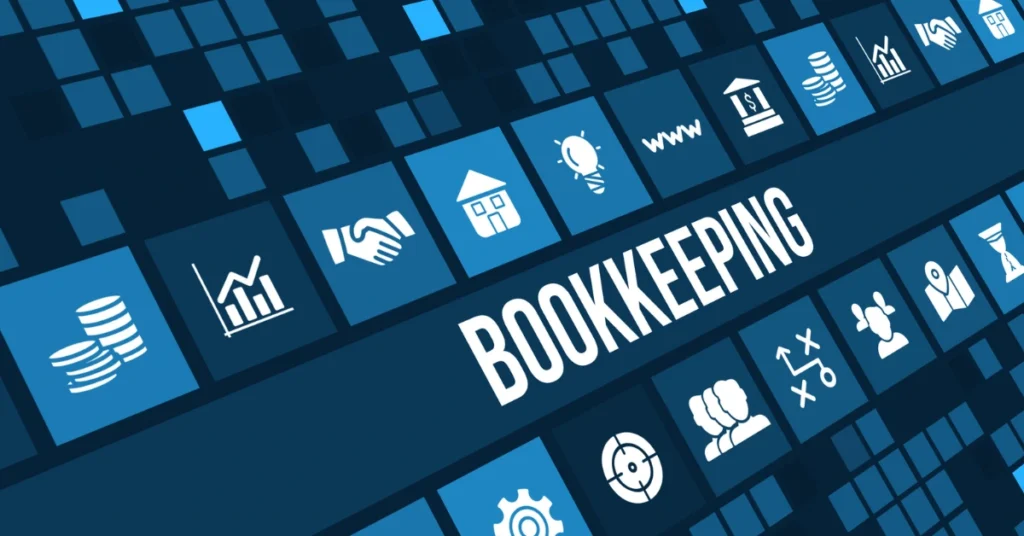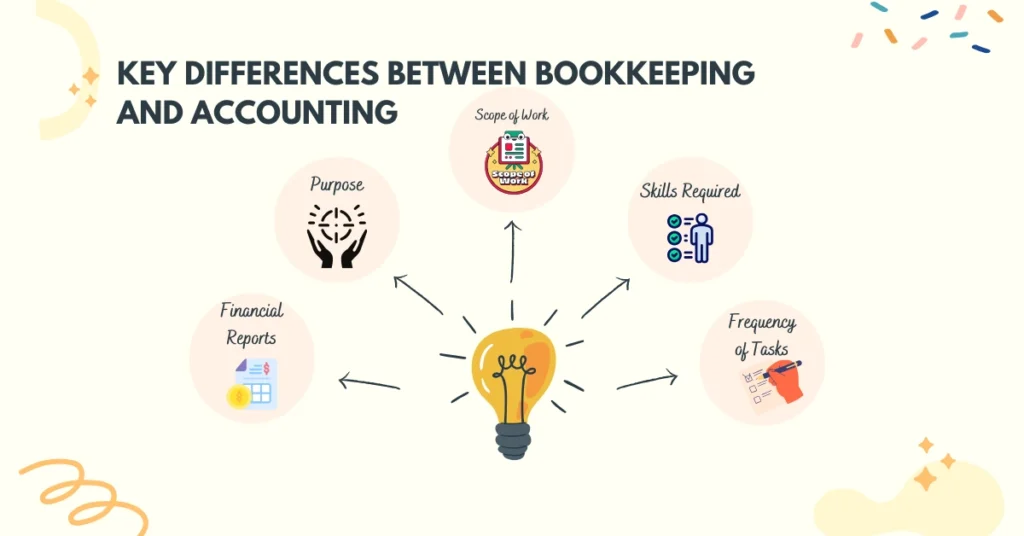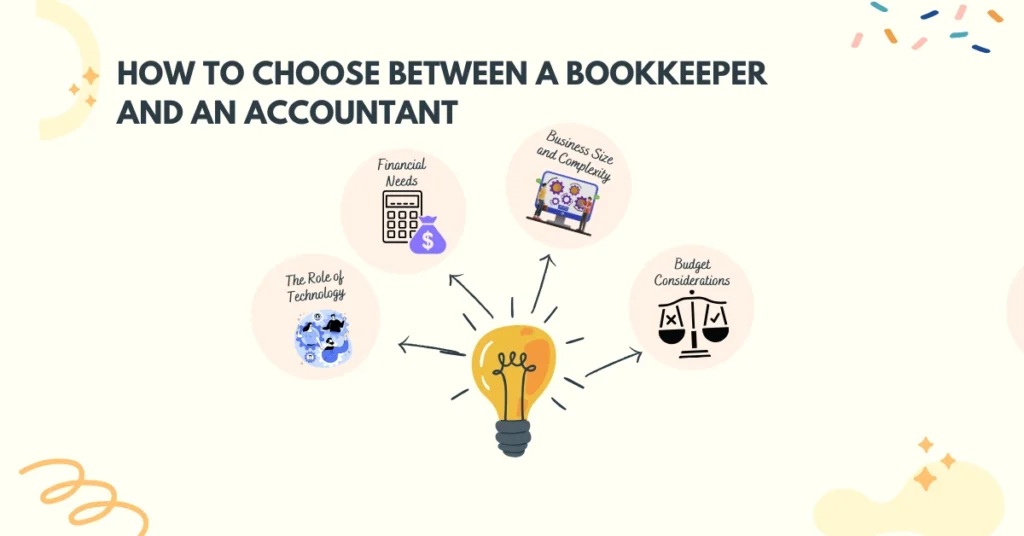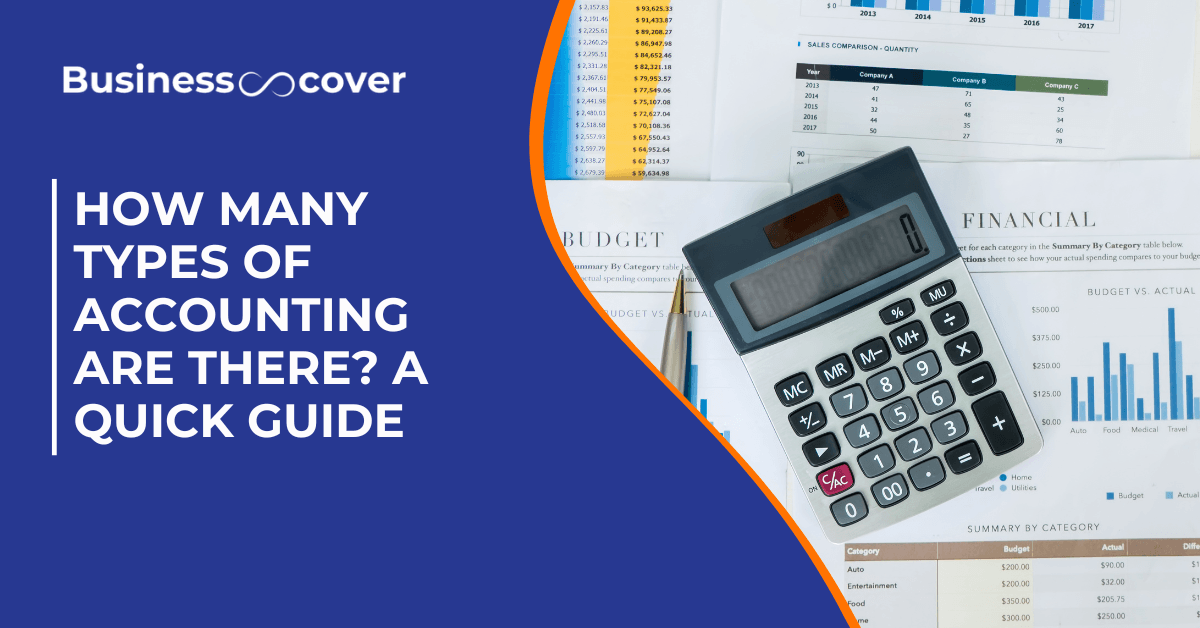In the world of finance, understanding the key differences between bookkeeping and accounting is crucial for businesses of all sizes. Although these terms are often used interchangeably, they refer to distinct processes that play a vital role in managing finances. This comprehensive guide will explore the nuances of each function, helping you distinguish between accounting and bookkeeping effectively.
What is Bookkeeping?

Bookkeeping refers to the systematic recording of financial transactions in an organization.That incorporates a daily record of all sources of revenue and expenditure, thus providing a record of all financial activities. Here are some essential aspects of bookkeeping:
- Daily Transactions: Sales bookkeepers record entries on sales while purchase bookkeepers record entries on purchases, receipts and payments. This ranges from till receipts either physical or electronic to sale and invoice records of businesses and online sales records.
- Financial Records: In terms of the book records they keep fairly structured records of /all the financial documents, such as invoices and receipts. Recording is especially essential since the financial state of an organization has to be documented properly, and the company has to meet the legal standards.
- Account Reconciliation: Persons who perform a bookkeeper’s job usually reconcile banking statements to account for any discrepancies regularly. This process assists in finding out the differences and making sure that the company records are correct with the bank records.
- Data Entry and Maintenance: Bookkeepers type financial information into the computer and, also, always have updated records. This saves a lot of the time used in searching for information from the different sub-systems when doing an audit, preparing reports or feeding information into the system from sub-systems that already hold the information.
In other words, bookkeeping is the backbone of any organization’s financial health, which means that businesses can at least track the flow of their money.
What is Accounting?

Accounting is a more general practice that involves the collection, processing, reporting and dissemination of financial information. It is a field of business that deals with the use of audit trails to analyze and report financial information. Here are the key components of accounting:
- Financial Statements: Accountants also generate accounts such as balance sheets, income statements, and statements of cash flows. Holders of these documents get the needed information about the financial status and profitability of the company.
- Tax Preparation: They file taxes, and oversee compliance with financial rules and requirements. Accountants understand the tax laws and find ways through which companies can reduce their taxes while in compliance.
- Budgeting and Forecasting: Company accountants also help companies predict future expenditure and income. This entails formulation of budgets, estimation of amount of cash which is expected to be on hand at any given period of time as well as assessing financial effects.
- Financial Analysis: These individuals have the capacity to work in analysing accounts and interpreting their business owners’ performances. This can comprise of profitability planning, cost control and investment appraisal.
The essential difference between bookkeeping and accounting is that while the former records transactions, the latter examines those transactions in order to present a glimpse of the financial health of a business.
Net vs Gross Pay: Key Differences, Calculations & Tips
Key Differences Between Bookkeeping and Accounting

It is critical for business owners to know the differences between bookkeeping and accounting because the two functions are different. Here are the primary distinctions:
1. Scope of Work
- Bookkeeping: Chiefly concerned with the process of capturing financial transactions. It includes a daily format of recording all the transactions that take place in style and within timelines.
- Accounting: This incorporates the use of rational analytical techniques involving computation and interpretation of account information. The data recorded is used by accountants to prepare financial statements, to forecast and to decide about financial management.
2. Purpose
Bookkeeping: Its purpose is the precise keeping of records of business transactions. The objective is simple, yet pearls of wisdom like these: you must be able to account for every financial transaction at your fingertips.
Accounting: Aim at offering suggestions on rights for capital selection. It takes tickets, vouchers or document details from accounting and modifies them into useful documents that could help in the formulation of business strategies.
3. Skills Required
Bookkeeping: Odd jobs entail a certain level of focus and a certain kind of office work-related skills. Candidates should be very organized in managing records and highly knowledgeable in fundamental accounting procedures.
Accounting: Requires analysis and comprehensive knowledge of financial laws and requirements. The field is highly educated, and other credentials include master’s degrees or certifications in finance or accounting.
4. Financial Reports
Bookkeeping: Creates simple accounting documents that comprise ledgers and journals. These are documented and are important for daily running of operations though they do not take into account financial stability.
Accounting: Prepares full set of accounts that inform various users of organisational financial position. These reports are relied on by the management the investors and the regulatory agencies in evaluating the financial position of the organization.
5. Frequency of Tasks
- Bookkeeping: Activities are done in a routine way or sometimes can be on a daily or weekly basis. This makes all financial transactions to be recorded right on time.
- Accounting: They are done mostly on a monthly or annual basis. In simpler organizations, the bookkeeping records are examined by accountants and they prepare the financial statements in defined intervals.
Also Read | Net vs Gross Pay: Key Differences, Calculations & Tips
How to Distinguish Between Accounting and Bookkeeping

To distinguish between accounting and bookkeeping, it’s helpful to consider the following questions:
- What are the daily responsibilities?
Talking about daily sales and purchases, recording of vouchers and every other detail of accounting then you are into bookkeeping. If you are dealing with more general aspects of money handling or the preparation of financial statements you are in the territory of accounting.
- What are the outcomes needed?
Is the practice of record keeping predominantly for keeping the running of the organisation’s affairs? If that’s the case, then bookkeeping is your concern. That’s the idea if you come looking for ways to plan strategically through the analysis of data such as in accounting.
Importance of Both Functions
Bookkeeping and accounting are important functions that any business must ensure it undertakes in order to improve its financial status. One complements the other in order to provide a precise result in the financial aspect. Here’s why each is important:
Importance of Bookkeeping
- Financial Accuracy: Reduces/ minimizes typing and paperwork errors that may affect record keeping accuracy. Appropriate accounting reduces the level of some arbitrary measurements.
- Regulatory Compliance: Aids in keeping records that meet legal requirements. Accounting practices help in the provision of documentation when firms undertake audits.
- Cash Flow Management: Helps to monitor cash flows as it is crucial for the future business existence. They give recommendations about the particular trends in cash flows, necessary for successful management of the cash balance.
Importance of Accounting
- Strategic Planning: They serve as a guide to the likely expenditures and revenues that are important in the growth process. It is the specialized knowledge of an accountant to point out possible problems or benefits in an organization’s financial realm.
- Financial Health Assessment: Enables virtual continual evaluation of the financial situation and profitability. They are useful to make decisions, how to invest resources and how much to spend for various activities.
- Tax Compliance: Is responsible for making certain that all things involving financial reporting to the authorities are accurate. Tax consultants assist clients in addressing the issue of tax laws, and developing an effective way of handling taxation.
Common Misconceptions
Bookkeeping and accounting are closely related to one another, making it easy for people to mix the two. Here are some common misconceptions clarified:
- Misconception 1: Bookkeepers can perform accounting tasks.
Although bookkeepers perform routine transactions, accountants have the knowledge to study and present the information in a broader aspect. Consequently, each of the roles entails distinct skills and information. - Misconception 2: Accounting is just bookkeeping with extra steps.
Though there is a significant overlap in the tasks that the two functions entail, accounting entails analysis and planning, which are tasks more advanced than mere recording. - Misconception 3: You don’t need both functions in a small business.
Each type of service is highly valuable to small businesses because they both help with recording transactions and making good business decisions.
The Interrelationship Between Bookkeeping and Accounting
Understanding the accounting and bookkeeping differences can help businesses streamline their financial processes. Here’s how these two functions interact:
- Data Flow: Accounting supplies the information needed for the preparation of data by the Accountants. Accounting helps by making sure that accountants are in a position to work with correct information.
- Collaboration: Both functions provide demands for coordination for financial proficiency and effectiveness. The business strategy is facilitated by the interaction between bookkeepers and accountants in the organization.
- Holistic Management: Both of them provide a full spectrum of a business organization’s financial position. Bookkeepers provide fundamental information to the company about its financial position while accountants analyze that data and provide solutions.
Choosing between a Bookkeeper and an Accountant
How to Choose Between a Bookkeeper and an Accountant

When considering whether to hire a bookkeeper or an accountant, evaluate your business needs:
1. Business Size and Complexity
- Small Businesses: Sometimes, simple record-keeping tasks can be handled by a simple bookkeeper. Many small business operations can easily be managed by a part-time bookkeeper for processing daily transactions.
- Larger Organizations: May need both to perform and coordinate difficult elements of financial operations and documentation. Large organizations require more accountants to work and manage complicated business financial activities.
2. Financial Needs
- Basic Record-Keeping: If all you need is for transactions to be recorded, a bookkeeper will do you much good. Bookkeepers can work well recording the day-to-day transactions which are so vital in the running of the business.
- Comprehensive Financial Analysis: If you need advice and help on numbers, money, and finance, then an accountant is the person to get. What distinguishes the work of accountants is that they give indications that contribute to business development.
3. Budget Considerations
Cost-Effective Solutions: If you have the means, then you should hire one, or both of these professionals in order to do a thorough job when it comes to assessing and planning for your finances. It may at times be advisable to hire both a bookkeeper and an accountant, but do this always bearing firmly in mind your finances’ plan.
4. The Role of Technology
In the current world, technology has become an essential part of bookkeeping as well as accounting. These are accomplished by many businesses using specific software to enhance their processes. Here’s how technology impacts these functions:
- Bookkeeping Software: The only way to deal with these records is to use certain software, for example, QuickBooks, Xero, etc., which minimizes the process of record entering and makes the work of bookkeepers easier.
- Accounting Platforms: Sophisticated accounting software enable production of complicated analysis and reports which make the accountants offer the needed strategic advice.
- Cloud-Based Solutions: Through cloud technology, data can be accessed in real-time, this makes it easy for bookkeepers as well as accountants to work together irrespective of the distance between them.
Conclusion
It is important for business people and particularly people in the field of business to understand the differences between bookkeeping and accounting. When functions are understood in terms of the roles they perform, you are in a position to understand and also manage your financial prospects much more accurately. While bookkeeping is the process of recording transactions, accounting is a process where recorded information is used to generate further useful information for managers. Both functions are crucial for effective financial reporting, compliance with legal requirements sustainable organisation, and the Company’s performance. It is crucial that you make a boost on bookkeeping as well as outsourcing your accounting needs for your organization to succeed in today’s financial environment.







